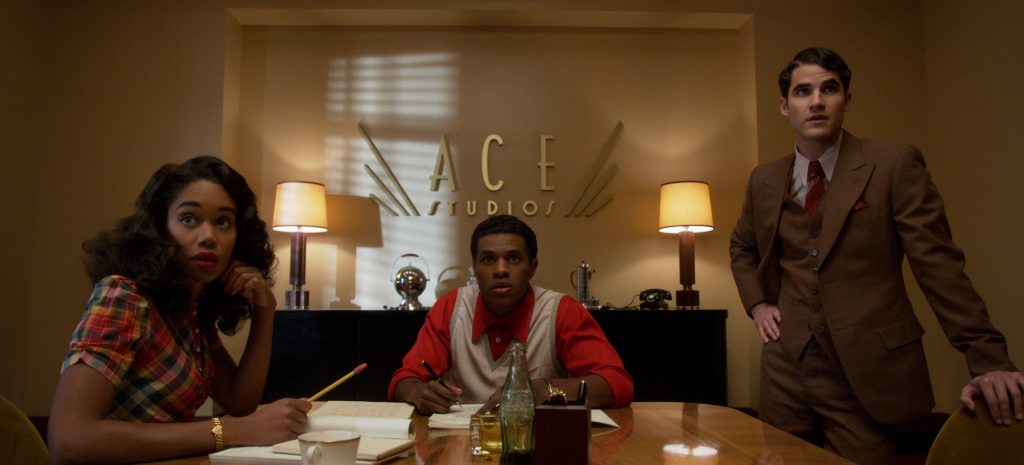Ryan Murphy’s Hollywood takes a broad brush to the industry’s history and repaints it, in hopes of inspiring change in the real world. And by the end of the limited series, it’s hard not to get swept up in the emotions and believe that films could be the beacon of change in an unjust world. However, when you look back at the series, you can’t help but see a wistful exercise where bigotry and opposition to progressive ideas just melt away when faced with a film that’s undeniably good. If only things were so easy in the real world.
In 1946, first-time director Raymond Ainsley (Darren Criss) is looking to adapt the story of Peg Entwistle, an aspiring actress who died after jumping off the Hollywood sign. He enlists the help of screenwriter Archie Coleman (Jeremy Pope) and girlfriend Camille Washington (Laura Harrier), both African Americans, as he lobbies Ace Studios to get the movie made. The movie is reworked from Peg to Meg, casting Camille as the lead and other Hollywood newcomers in several roles. Despite several setbacks, the film gets released and garners overwhelmingly positive reception, to the point of sweeping the Oscars in the finale.
Hollywood doesn’t begin with such a schmaltzy approach. Jack Costello (David Corenswet), another aspiring actor, soon finds himself working for a gas station that doubles as a prostituion ring for the stars, and soon meets up with Archie Coleman. Another new actor, Roy Fitzerald, is repackaged into Rock Hudson (Jake Picking) by his agent Henry Wilson (Jim Parsons), who takes advantage of him several times and later sets him up to attend a private party that’s famous for fraternization among Hollywood elites, struggling actors and impressionable boys from colleges. Rock and Archie are living together as boyfriends, and when Rock tells Archie about what Henry did to him, Archie reasons that this is what people have to do to get ahead in Hollywood. However, these developments are soon abandoned for more saccharine fare. Even Henry Wilson, who seemed irredeemable at first, pays his penance by the end of the series.

What could have been an intriguing look at the industry is soon sidelined for Murphy’s benevolent fantasy. There’s a scene where Eleanor Roosevelt drops by and urges interim studio head Avis Amberg (Patti LuPone) to greenlight Meg, in the hopes that black girls all over the country can aspire to being a Hollywood actress themselves. When the film finally releases, despite an attempt by lawyers to burn the print, racial outrage soon gives way to unanimous adulation. Apparently, all it takes to defuse racial tension is to release a compelling film.
What could have been compelling, perhaps, was an in-depth look at how such an attempt at progressive film-making would have been met with ugly, dangerous backlash.
In an era where segregation was not only the norm but the law, it feels like Hollywood took the easy way out by not giving enough consideration to the realities of the time. Some of the achievements shown within the series haven’t still been matched in the real Hollywood, which undermines the struggles of the actual diverse men and women who have tried to make their mark on the industry.
If there was more runtime in the seven episode series, maybe there would have been room for more nuance in the story. Hollywood isn’t entirely without merit, and even as a wistful alternate history story, it could have been better, as evidenced by the fantastic Once Upon a Time…in Hollywood. With Ryan Murphy slated to do many more projects with Netflix, let’s hope that his future projects are crafted with better care for real world circumstances.







